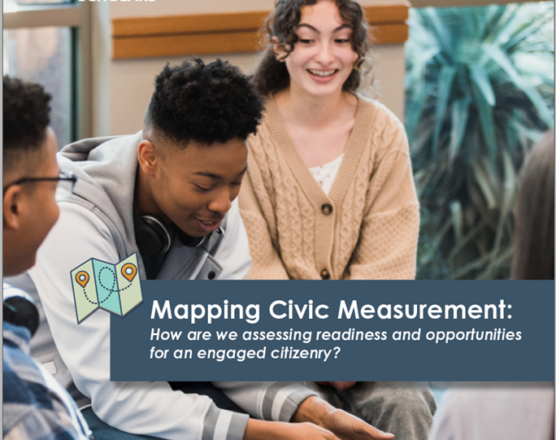Share
Last week, a headline caught my eye: “Researchers Say High School Civics Test Doesn’t Boost Voting. They’ve Lost the Plot.” This immediately struck a chord with me—it’s a sentiment not often expressed so plainly in the civic learning field. While our field places significant emphasis on voting as a hallmark of civic engagement, do we inadvertently undervalue the myriad factors contributing to the singular act of casting a ballot?
Frederick M. Hess from the American Enterprise Institute seems to share this perspective. In his Forbes op-ed, Hess writes, “democratic government is about a lot more than activism and voting. It’s also about respect for rules, personal responsibility, patience, and a willingness to work with those who see things differently.” This reaction stems from a press release by the American Educational Research Association (AERA), announcing that the “State-Mandated Civics Test Policy Does Not Improve Youth Voter Turnout.”
I too believe that youth civic learning encompasses much more than just voter registration and turnout. The urgency of the work at the Institute of Citizens & Scholars stems from our commitment to a holistic approach to civic learning. We acknowledge field-wide gaps in providing younger citizens with resources to prepare them comprehensively for civic participation, which goes beyond the act of voting.
What does it take to help citizens prepare themselves to participate effectively? An effective citizen must be:
- Civically well-informed about our foundational principles, governing structures, history and the difference between fact and opinion.
- Productively engaged by taking an active role in local and national decision-making, working with those whose views might differ from our own.
- Committed to democracy, and willing to do the hard work to keep America’s fabric strong.
Approached in this way, it’s clear that measuring more than just voter turnout is essential to understanding whether young people are empowered as citizens. The goal of civics education extends beyond memorizing foundational principles and governing structures. While memorization may result in textbook knowledge, does it truly translate to being civically well-informed? Studying and understanding our framework is meant to equip us to assess and make good decisions about the present and future. Critical thinking and the application of principles tested in civics go beyond a singular moment. Being civically well-informed is an ongoing, continuous learning process.
Likewise, productive engagement encompasses more than simply appearing at the ballot box. While voting is an important way to shape local and national decision-making, the hard work for citizens and the people who represent them in government begins the day after the vote. We must engage in collaborative problem-solving and provide our input to contribute to the best decisions for our community and nation. Productive engagement manifests in various forms, whether it’s writing to your representative, attending town halls, or engaging with neighbors. Being productively engaged is an ongoing process of continual participation.
Lastly, expressing our commitment to our constitutional democracy is an ongoing effort, not confined to Election Day. Even when we disagree (and yes do we disagree!), our aspiration to unite around fundamental shared values and improve our institutions underscores the use of our individual agency to express our version of patriotism. Those prepared to participate believe America is worth improving. Being committed to our democracy is an enduring process of continual dedication.
Civic learning paves the way to numerous destinations beyond the voting booth. To be civically well-informed, productively engaged, and committed to democracy is to dedicate oneself to finding improved paths forward together, fostering a more fulfilling and peaceful coexistence.
Stay Engaged
Get More News
Join our mailing list to get more news like this to your mailbox.
Support Our Work
Help us invest in the talent, ideas, and networks that will develop young people as effective, lifelong citizens.
Ways to Support Us

